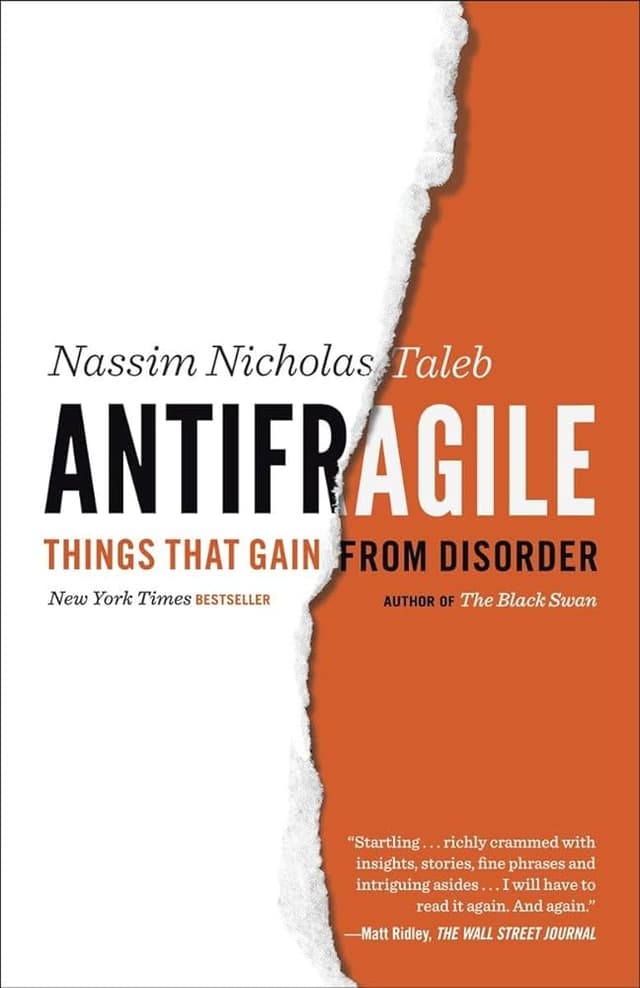Antifragile: Things That Gain from Disorder vs. Sapiens: A Brief History of Humankind by Yuval Noah Harari
Antifragile: Things That Gain from Disorder
"Antifragile: Things That Gain from Disorder" by Nassim Nicholas Taleb is a groundbreaking exploration of systems and entities that thrive and grow stronger in the face of stress, volatility, and chaos. Taleb introduces the concept of "antifragility," which goes beyond resilience or robustness. Through a mix of philosophy, practical wisdom, and real-world examples, Taleb illustrates how embracing uncertainty and leveraging disorder can lead to success and innovation. This book is essential for anyone interested in risk management, personal development, and understanding how to benefit from uncertainty and change.
Sapiens: A Brief History of Humankind by Yuval Noah Harari
The great thing about this book is that it takes a big-picture view of human history. It attempts to explain the main themes of human history without getting bogged down in the details. Sapiens also debunks many popular myths about human history, including the one that people today live happier lives and have better diets than our hunter-gatherer predecessors. It comes with an epilogue about the future of humankind in light of ever-accelerating technological progress. With the recent advances in AI it is more relevant than ever. If you're going to read one book on history this year, read this one.


Reviews
Reviewed on 2/29/2024
I remember reading Antifragile when it first came out and it made a huge impression. It changed the way I think in plenty of subtle ways. I've been rereading Nassim Nicholas Taleb recently, starting with Black Swan. I really want to reread Antifragile this year too.
Reviews
| Item | Votes | Upvote |
|---|---|---|
| Innovative and original concepts | 1 | |
| Practical applications across various fields | 1 | |
| Engaging and thought-provoking narrative | 1 |
| Item | Votes | Upvote |
|---|---|---|
| Taleb's writing style can be polarizing | 1 |
| Item | Votes | Upvote |
|---|---|---|
| No pros yet, would you like to add one? | ||
| Item | Votes | Upvote |
|---|---|---|
| No cons yet, would you like to add one? | ||
Frequently Asked Questions
'Antifragile' by Nassim Nicholas Taleb and 'Sapiens: A Brief History of Humankind' by Yuval Noah Harari are both influential books but serve different purposes. 'Antifragile' focuses on the concept of benefiting from disorder and chaos, impacting the reader's perspective on resilience and adaptability. 'Sapiens', on the other hand, provides a comprehensive overview of human history and challenges many preconceived notions about progress and happiness. If you're interested in philosophical and practical life insights, 'Antifragile' may be more impactful. For a deep dive into human history and societal evolution, 'Sapiens' is the better choice.
'Sapiens: A Brief History of Humankind' offers a better perspective on human history as it is specifically focused on the evolution of humankind, tracing the development of societies, cultures, and economies. It provides a broad overview of our species' journey from the emergence of Homo sapiens to present-day issues. 'Antifragile' by Nassim Nicholas Taleb, while insightful, deals more with the concept of becoming stronger through challenges and does not focus on historical events or contexts.
'Antifragile: Things That Gain from Disorder' by Nassim Nicholas Taleb is a groundbreaking exploration of systems and entities that thrive and grow stronger in the face of stress, volatility, and chaos. Taleb introduces the concept of 'antifragility,' which goes beyond resilience or robustness. Through a mix of philosophy, practical wisdom, and real-world examples, Taleb illustrates how embracing uncertainty and leveraging disorder can lead to success and innovation. This book is essential for anyone interested in risk management, personal development, and understanding how to benefit from uncertainty and change.
Pros of 'Antifragile: Things That Gain from Disorder' include its innovative and original concepts, practical applications across various fields, and an engaging and thought-provoking narrative. However, a con noted by some readers is that Taleb's writing style can be polarizing.
Nassim Nicholas Taleb is a renowned scholar, statistician, and former trader known for his work on probability, uncertainty, and risk management. He is the author of several influential books, including 'The Black Swan,' 'Fooled by Randomness,' and 'Antifragile.' Taleb's work often focuses on the limits of knowledge and the impact of rare, unpredictable events.
'Sapiens: A Brief History of Humankind' by Yuval Noah Harari takes a big-picture view of human history. It explains the main themes of human evolution and development without getting bogged down in details. The book also debunks many popular myths about human history, such as the idea that people today live happier lives or have better diets than our hunter-gatherer predecessors. It ends with an epilogue discussing the future of humankind in light of accelerating technological progress, making it particularly relevant given recent advances in AI.
'Sapiens: A Brief History of Humankind' discusses several main themes, including the cognitive revolution, the agricultural revolution, the unification of humankind, and the scientific revolution. The book explores how these events have shaped human societies, cultures, and economies. It also delves into the impact of technological advancements on the future of humanity.
Yuval Noah Harari is an Israeli historian and professor in the Department of History at the Hebrew University of Jerusalem. He is known for his bestselling books 'Sapiens: A Brief History of Humankind', 'Homo Deus: A Brief History of Tomorrow', and '21 Lessons for the 21st Century'. Harari's work focuses on broad historical processes and their implications for the future.
Pros of 'Sapiens: A Brief History of Humankind' include its broad, comprehensive view of human history and its ability to debunk popular myths. The book is also praised for its engaging writing style and thought-provoking insights. Cons might include its broad scope, which can sometimes lead to oversimplification of complex historical events, and the fact that some readers may find its speculative future predictions less convincing.



















